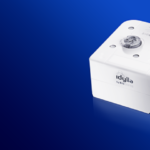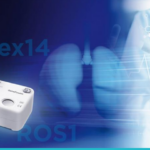Biocartis Obtains Exclusive Worldwide License Rights for EGFR Ectodomain Mutations Determining Response to Targeted Colorectal Cancer Therapy
Products are for professional/laboratory use only.
PRESS RELEASE: 28 August 2018
Mechelen, Belgium, 28 August 2018 – Biocartis Group NV (the ‘Company’ or ‘Biocartis’), an innovative molecular diagnostics company (Euronext Brussels: BCART), today announces that it has obtained exclusive worldwide license rights for highly innovative EGFR ectodomain mutations that have shown to determine response to targeted therapy for patients with metastatic colorectal cancer1 (mCRC).
The new agreement is a conversion of two existing agreements with Hospital Del Mar (Barcelona, Spain) and inventors Dr. Bardelli and Dr. Arena from the University of Torino (Torino, Italy) in relation to two patent families of EGFR ectodomain mutations. Biocartis is entitled to sublicense the licensed rights to third parties.
Based on international guidelines[1], patients with mCRC are first tested on RAS-BRAF mutations for treatment with anti-EGFR targeted therapy. However, between 40-55% of these patients[2] develop resistance to this therapy, more specifically due to mutations arising in the RAS-BRAF genes, and as recently shown[3], also in the EGFR ectodomain[4]. To understand second and third line treatment options, it is therefore important to test if these mCRC patients develop these particular EGFR ectodomain mutations, since a triple negative RAS-BRAF-EGFR ectodomain result would mean that these patients could still benefit from certain targeted treatments[5].
The agreement includes the licensing of the EGFR S492R resistance mutation, which was the first EGFR ectodomain mutation detected by Dr. Montagut and Dr. Albanell (Hospital del Mar, Barcelona, Spain) in 2012[6] and subsequently licensed to Biocartis for commercialization on the Idylla(TM) system, more specifically in the solid biopsy Idylla(TM) NRAS-BRAF-EGFR S492R Mutation Assay (RUO)[7] as well as in the liquid biopsy Idylla(TM) ctNRAS-BRAF-EGFR S492R Mutation Assay (RUO7). Additional EGFR ectodomain mutations covered by the agreement were identified in a collaborative effort between the laboratories of Dr. Montagut and Dr. Bardelli and Dr. Arena in 2016.
Financial details of the agreement are not disclosed.
— END —
More information:
Renate Degrave
Manager Corporate Communications & Investor Relations
e-mail rdegrave@biocartis.com
tel +32 15 631 729
mobile +32 471 53 60 64
About Biocartis
Biocartis (Euronext Brussels: BCART) is an innovative molecular diagnostics (MDx) company providing next generation diagnostic solutions aimed at improving clinical practice for the benefit of patients, clinicians, payers and industry. Biocartis’ proprietary MDx Idylla(TM) platform is a fully automated sample-to-result, real-time PCR (Polymerase Chain Reaction) system that offers accurate, highly reliable molecular information from virtually any biological sample in virtually any setting. Biocartis launched the Idylla(TM) platform in September 2014. Biocartis is developing and marketing a rapidly expanding test menu addressing key unmet clinical needs in oncology and infectious diseases. These areas represent respectively the fastest growing and largest segments of the MDx market worldwide. Today, Biocartis offers fifteen oncology tests and two infectious disease tests in Europe. More information: www.biocartis.com. Press Photo Library available here. Follow us on Twitter: @Biocartis_.
Biocartis and Idylla(TM) are registered trademarks in Europe, the United States and other countries. Biocartis trademark and logo and Idylla(TM) trademark and logo are used trademarks belonging to Biocartis. This press release is not for distribution, directly or indirectly, in any jurisdiction where to do so would be unlawful. Any persons reading this press release should inform themselves of and observe any such restrictions. Biocartis takes no responsibility for any violation of any such restrictions by any person. Please refer to the product labeling for applicable intended uses for each individual Biocartis product. This press release does not constitute an offer or invitation for the sale or purchase of securities in any jurisdiction. No securities of Biocartis may be offered or sold in the United States of America absent registration with the United States Securities and Exchange Commission or an exemption from registration under the U.S. Securities Act of 1933, as amended.
Forward-looking statements
This press release may contain forward-looking statements. Such forward-looking statements are not guarantees of future performance. These forward-looking statements speak only as of the date of this press release. Biocartis expressly disclaims any obligation or undertaking to release any updates or revisions to any forward-looking statements in this press release, except if specifically required to do so by law or regulation. You should not place undue reliance on forward-looking statements.
[1] ESMO (ESMO consensus guidelines for the management of patients with metastatic colorectal cancer. Annals of Oncology 0: 1-37, 2016); NCCN (NCCN Clinical Practice Guidelines in Oncology – Colon Cancer – Version 2.2016); ASCO (Allegra C.J. et al. Extended RAS gene mutation testing in metastatic Colorectal Carcinoma to predict response to antiepidermal growth factor receptor monoclonal antibody therapy: American Society of Clinical Oncology Provisional Clinical Opinion Update 2015. Journal of Clinical Oncology 2016; 34(2):179-85) and CAP/AMP/ASCO
[2] Montagut et al., “Efficacy of Sym004 in Patients With Metastatic Colorectal Cancer With Acquired Resistance to Anti-EGFR Therapy and Molecularly Selected by Circulating Tumor DNA Analyses A Phase 2 Randomized Clinical Trial”, JAMA Oncol. doi:10.1001/jamaoncol.2017.5245, published online on 8 February 2018.
[3] Arena et al., “Emergence of Multiple EGFR Extracellular Mutations during Cetuximab Treatment in Colorectal Cancer”, Clinical Cancer Research, 10.1158/1078-0432.CCR-14-2821, published May 2015.
[4] This is the external part of the cell where anti-EGFR antibodies for the treatment of colorectal cancer prevent EGFR binding. It concerns an acquired resistance mechanism that renders the anti-EGFR treatment ineffective. The specific mutations were detected by comparing advanced preclinical methods with colorectal cancer patient data to identify these recently detected mechanisms of resistance. Source: Montagut et al. JAMA 2018.
[5] This new indication for second line treatment is referred to as triple negative mCRC, or TNmCRC.
[6] Montagut et al. (2012), “Identification of a mutation in the extracellular domain of the Epidermal Growth Factor Receptor conferring cetuximab resistance in colorectal cancer”. Nat Med. 18: 221-223.
[7] Idylla(TM) NRAS-BRAF-EGFRS492R Mutation Assay (Research Use Only or RUO), not for use in diagnostic procedures.








